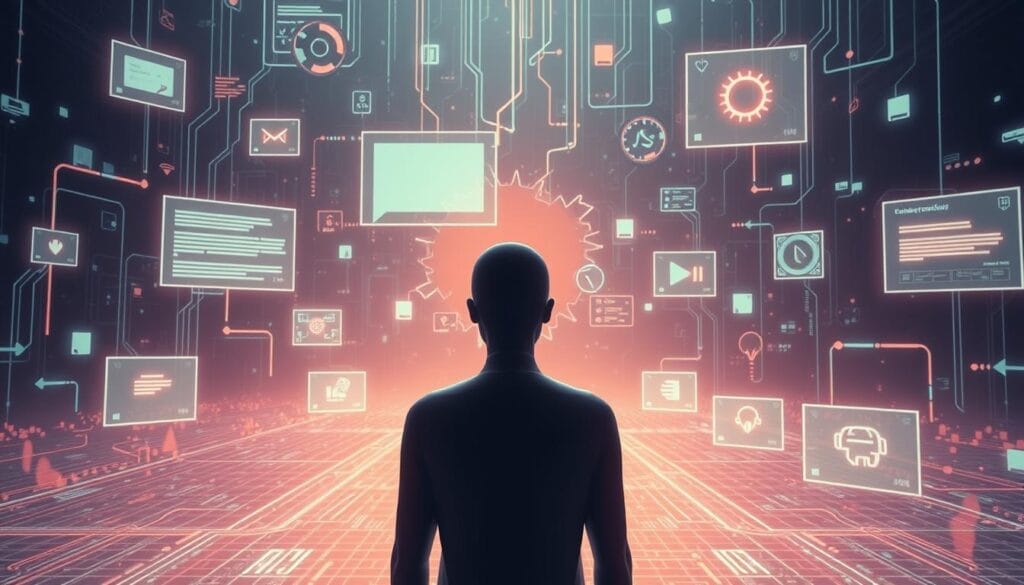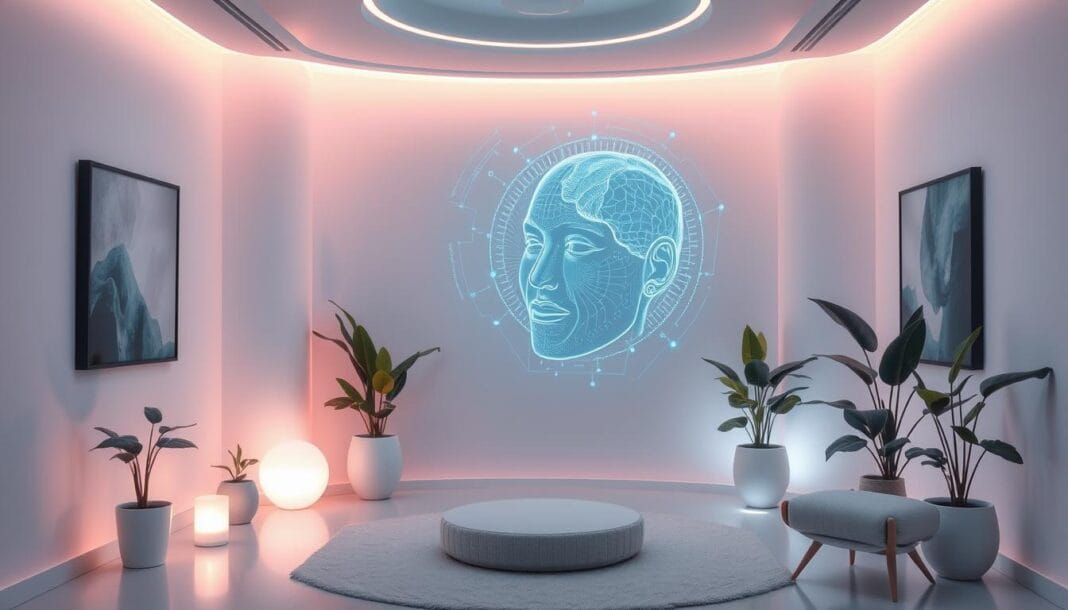I’ve dealt with anxiety and depression, and finding help was tough. The stigma, long waits, and cost were huge hurdles. But what if there was a better way to get support? AI-powered virtual therapy might be the answer.
AI is changing therapy with chatbots and virtual therapists like Wysa and Woebot. They offer 24/7 help with strategies like cognitive-behavioral therapy. These tools make mental health support more available and could save therapists up to 10 hours a week.
Most people see AI in therapy as a good thing, especially when humans oversee it. Cognitive-behavioral therapists are especially open to AI. This shows AI’s growing role in mental health care.
Understanding the Evolution of AI in Mental Healthcare
The mental health field is facing big challenges. Only about 50% of adults with mental illness get help in the U.S. and Canada. Issues like negative attitudes, lack of access, long wait times, and high costs are big barriers. The COVID-19 pandemic made these problems worse, showing the need for digital mental health solutions.
The Growing Need for Digital Mental Health Solutions
Mental health issues like depression and anxiety cost the global economy $1 trillion each year. AI-powered therapy and online mental health services are seen as good alternatives. They offer privacy, are easy to get to, and are available 24/7.
Traditional Therapy vs. AI-Powered Alternatives
Diagnosing mental health issues often relies on personal feelings and self-reporting. AI can help by looking at big data sets to find and predict mental health problems. AI chatbots are being tested to treat depression and anxiety. They are seen as affordable, accessible, and scalable, but more research is needed to prove they work.
Current State of Mental Health Access
There’s a shortage of mental health workers, which means some groups might not get the help they need. But, digital therapies could help these groups. Still, there are concerns about privacy and the lack of human interaction. Building trust in AI mental health solutions requires empathy, ethical development, clear communication, and following the Hippocratic principle of “first, do no harm”.
| Key Challenges in Mental Healthcare | AI-Powered Solutions |
|---|---|
|
|
“AI applications in mental healthcare have increased significantly over the past decades, with technologies like machine learning and deep learning aiming to solve challenges in this field.”
How AI in Mental Health is Transforming Therapeutic Care
Artificial intelligence (AI) is changing mental healthcare. It’s making therapy better in many ways. This includes how we start treatment, give therapy, and check on progress.
AI is helping with digital therapies that work well. These therapies help manage mental health symptoms. They also keep people in treatment, just like traditional methods.
AI helps find the best therapy approaches. It also predicts how well treatment will work. This means doctors can make therapy more effective for each patient.
Robots are also helping in mental health care. They assist in autism therapy. Robots like NAO and QTrobot help kids understand social cues and emotions.
AI is making mental health care better. It automates tasks, improves therapy, and offers ongoing support. This makes mental health care more accessible and effective.
Read more: AI in Content Creation: Can Machines Replace Writers, Designers, and Artists?
“The integration of technology into mental health care has led to transformative trends, changing how services are provided and accessed to address geographical and economic barriers.”
Key Technologies Powering Virtual Therapy Solutions
AI-powered virtual therapy solutions are changing mental healthcare. They use advanced technologies like natural language processing, machine learning, and emotional recognition systems. These tools are at the heart of new platforms that make therapy more accessible.
Natural Language Processing in Therapeutic Conversations
Natural Language Processing (NLP) lets AI therapists understand and respond to users. It helps them have real conversations that feel like talking to a person. This way, virtual therapy can be as effective as in-person sessions.
Machine Learning for Personalized Treatment
Machine Learning (ML) helps tailor therapy to each person. It uses data to find patterns and suggest the best treatment plans. This makes therapy more effective and personal for everyone.
Emotional Recognition Systems
Emotional recognition systems are key to better therapy. They help AI therapists understand and respond to users’ feelings. This creates a deeper connection and more meaningful support.
These technologies work together to make virtual therapy better. They help people get the mental health care they need in a way that’s easy to access. As AI in mental health grows, these tools will make therapy even more effective and inclusive.
Benefits and Advantages of AI-Powered Mental Health Support
In today’s world, mental health is a big issue. AI is helping by making therapy more accessible and effective. AI mental health benefits are many and can really help people.
AI makes therapy easier to get. You can talk to virtual therapists anytime, anywhere. This is great for those who can’t go to in-person therapy because of time or location.
Virtual therapy also lets people feel more comfortable. They can share their feelings without fear. This makes therapy more effective.
AI also makes therapy cheaper. It helps therapists do their jobs faster, saving money. This makes therapy more affordable for everyone.
| AI Mental Health Benefits | Virtual Therapy Advantages | Digital Mental Health Support |
|---|---|---|
| Increased accessibility | 24/7 availability | Cost-effective solutions |
| Enhanced anonymity | Reduced stigma and barriers | Personalized treatment plans |
| Automated processes | Improved clinical decision-making | Continuous monitoring and feedback |
AI tools also create plans just for you. They use data to make therapy fit your needs. This makes therapy more effective and enjoyable.
But, we still need human therapists too. AI and humans working together is the best way. This way, we can really help people get better.
Read more: The Future of AI-Powered Personal Assistants: What Lies Ahead Beyond Siri and Alexa

Popular AI Therapy Platforms and Their Features
More people are looking for easy ways to get mental health help. AI therapy platforms are stepping up to offer virtual support. They use new tech to give personalized therapy, meeting the needs of many.
Woebot and CBT-Based Solutions
Woebot is a well-known AI chatbot that uses cognitive-behavioral therapy (CBT). It helps users change their negative thoughts and find better ways to cope. With its fun design and daily sessions, Woebot makes getting help easier and more fun.
Wysa’s Approach to AI Counseling
Wysa is a top AI therapy platform. It mixes CBT, DBT, and mindfulness to offer personal emotional support. Its mobile app is highly rated, and it focuses on keeping user info private. This has made Wysa a trusted choice for many looking for mental health help.
Emerging Virtual Therapy Tools
New virtual therapy tools are coming out, offering more ways to get help. Apps like Calm and Headspace offer guided meditations. Platforms like 7 Cups let users talk to trained listeners for support.
“The mental health tracker app BioBase reportedly helps reduce the length and number of sick days by up to 31%.”
These new tools are changing mental health care. They make it easier for people to get help, even if they can’t see a therapist in person. As tech keeps improving, AI therapy will likely play a bigger role in helping people.
Limitations and Challenges of Virtual Therapists
AI-powered virtual therapists have a lot of potential to help more people with mental health issues. But, they face some big challenges. One major issue is that they can’t fully understand human emotions like real therapists do.
Another big problem is that people might rely too much on AI instead of seeing real therapists. This could make them feel safe when they’re not. Also, there are worries about keeping personal mental health info safe online.
- AI therapy limitations: They can’t fully understand human emotions and empathy.
- Virtual therapist challenges: People might rely too much on AI and not see real therapists.
- Digital mental health concerns: Keeping personal mental health info safe online is a big worry.
There’s also a lot of debate about how well AI helps with mental health. Some studies show good results, but the data is often not strong. We need more research to understand how AI will really help in the long run.
“The application of AI in mental healthcare is still in its early stages, raising concerns about biases, ethical considerations, and patient safety.”

Virtual therapists should be seen as a helpful tool, not a full replacement for real therapists. By facing these challenges, we can make AI in mental health better. This way, we can make care more accessible and still keep the important human touch in therapy.
The Role of Human Therapists in AI-Enhanced Mental Healthcare
As AI in mental healthcare grows, human therapists are still key. AI tools offer support, but can’t replace empathy and emotional understanding. These are things only humans can give.
Collaborative Approaches to Treatment
The best way to use AI is as a tool to help, not replace, human therapists. AI can help with initial checks, tracking progress, and suggesting treatments. But, human therapists are there to offer emotional support and care.
Supervision and Oversight of AI Systems
Human therapists are crucial in making sure AI is used right in mental health. They watch over AI to prevent mistakes or biases. They add the empathy and understanding that AI can’t give, keeping the therapy effective.
Using AI in mental health isn’t about getting rid of human therapists. It’s about using both to help more people. Together, they can make mental health care better, more personal, and easier to get.
| Human Therapists | AI-Enhanced Mental Healthcare |
|---|---|
| Provide empathy, emotional understanding, and personalized care | Offer 24/7 accessibility, convenience, and data-driven insights |
| Maintain oversight and supervision of AI systems | Assist with initial assessments, progress tracking, and personalized treatment recommendations |
| Preserve the essential therapeutic relationship | Complement and augment the work of human therapists |
By working together, human therapists and AI can change mental health care for the better. They can meet the growing need for help and make care more accessible and effective.
Privacy and Ethical Considerations
AI in mental healthcare is growing fast, but it raises big privacy and ethical questions. These issues are key to making AI work well and safely in this field.
Protecting Sensitive Mental Health Data
Keeping mental health data safe is a big worry. AI makes a lot of this data. It’s vital to follow laws like HIPAA to keep patient info private.
Algorithmic Bias and Inclusivity
AI might not treat everyone fairly. This could lead to unfair treatment in mental health care. We need AI that works for everyone, not just some.
Ethical Guidelines and Regulations
As AI in mental health grows, we need clear rules. These rules should help use AI wisely and keep patient privacy safe. It’s a tough job, but it’s essential.
| Key Ethical Considerations | Potential Challenges |
|---|---|
| Data Privacy and Security | Ensuring the confidentiality and integrity of sensitive mental health data |
| Algorithmic Bias and Fairness | Developing inclusive and unbiased AI systems that do not perpetuate discrimination |
| Transparency and Explainability | Providing clear explanations of AI decision-making processes to patients and clinicians |
| Human Oversight and Accountability | Maintaining appropriate levels of human supervision and responsibility for AI-driven interventions |
By tackling these privacy and ethics issues, AI in mental health can be used wisely. This way, we keep patients’ trust and well-being safe.
“The responsible integration of AI in mental healthcare requires a delicate balance between harnessing the benefits of this technology and upholding the highest ethical standards to protect patient privacy and ensure inclusive, equitable care.”
Research and Evidence Supporting AI Therapeutic Interventions
AI in mental healthcare is a growing field. Studies show AI can help manage mental health symptoms like depression and anxiety. Users like AI therapy because it’s always available and private.
People enjoy AI therapy because it’s easy to use and tailored to them. Apps like Woebot and Wysa keep users coming back for support. They find value in the ongoing help these virtual therapists offer.
Clinical Studies and Outcomes
Many studies have looked into AI’s role in mental health. A meta-analysis of 17 studies found AI therapy is as effective as traditional therapy. It shows AI can deliver proven treatments like cognitive-behavioral therapy (CBT).
User Satisfaction and Engagement Metrics
- A study on Woebot showed users were very happy and kept coming back. This proves AI-based support is appealing.
- Wysa also reported high user engagement. Many people use it regularly for mental health support.
- Users like the 24/7 access and anonymity of AI therapy. These factors boost satisfaction and keep users engaged.
While AI in mental health looks promising, more research is needed. Better studies are required to fully grasp AI’s potential and long-term effects.
Future Developments and Potential Applications
The future of AI in mental health looks bright. It will blend with new technologies like virtual reality (VR) therapy. This mix could lead to more tailored and effective treatments. AI might also help doctors diagnose and treat mental health issues more accurately.
AI is set to be a big help in the mental health crisis. Almost 1 billion people face mental health issues, and depression affects over 264 million. AI could make diagnoses 90% more accurate and cut therapy wait times by 70%. It could also save up to $300 billion a year in healthcare costs.
AI-driven treatments can make therapy more engaging and effective. They can improve patient care by up to 60%. This technology could reach more people, especially in areas with few mental health resources.
As AI becomes more common in mental health care, we need strong rules to keep it safe and fair. Protecting patient privacy and getting their consent is key. With the right rules, AI could greatly help people with mental health issues, making society healthier and stronger.
| Statistic | Value |
|---|---|
| People affected by mental health disorders worldwide | Approximately 1 billion |
| People impacted by depression globally | Over 264 million |
| Improvement in diagnostic accuracy with AI | Up to 90% |
| Reduction in therapy wait times with AI | Up to 70% |
| Potential annual cost savings in global healthcare with AI | Up to $300 billion |
| Improvement in patient engagement and adherence with personalized AI interventions | Up to 60% |
The future of AI mental health future, virtual reality therapy, and computational psychiatry is exciting. These technologies could change mental health care for the better. They promise a more accessible, personalized, and effective system, helping people all over the world.
Conclusion
AI in mental healthcare is very promising. It could make therapy more accessible, personal, and efficient. Virtual therapists can’t replace human professionals but can be great helpers. They offer quick support and tailored advice to meet the growing need for mental health services.
But, using AI in mental health needs careful thought. We must consider ethics, privacy, and the human touch in therapy. Finding the right mix of AI benefits and human connection is key. This ensures good mental health outcomes and builds trust in new technologies.
The future of digital mental health looks bright with AI and other tech advancements. We must focus on privacy, fairness, and ethics. This way, AI can truly help those who need mental health support.
FAQ
What is the role of AI in mental healthcare?
What are the benefits of AI-powered virtual therapy solutions?
What are some popular AI therapy platforms and their features?
What are the limitations and challenges of virtual therapists?
How do human therapists work with AI-enhanced mental healthcare?
What are the privacy and ethical considerations surrounding the use of AI in mental healthcare?
What does the research say about the effectiveness of AI therapeutic interventions?
What is the future potential of AI in mental health?
Source Links
- AI in therapy? Here’s what people think about it – according to research | Upheal – https://www.upheal.io/blog/ai-in-therapy-heres-what-people-think-about-it-according-to-research
- What is AI Therapy and What Is it Used For? | Ellie Mental Health, PLLP – https://elliementalhealth.com/what-is-ai-therapy-and-what-is-it-used-for/
- The Intersection of AI and Mental Health Care: Past, Present & Future – https://atxwoman.com/ai-and-mental-health-care/
- Exploring the Role of Artificial Intelligence in Mental Healthcare: Current Trends and Future Directions – A Narrative Review for a Comprehensive Insight – https://pmc.ncbi.nlm.nih.gov/articles/PMC11127648/
- AI in Psychiatry: Changing the Landscape of Mental Health Care – https://www.psychiatrictimes.com/view/ai-in-psychiatry-changing-the-landscape-of-mental-health-care
- AI and Robotics for Mental Health: Transforming Patient Care – https://www.electropages.com/blog/2024/09/impact-of-ai-and-robotics-on-advancing-mental-health-care
- Using AI to Connect You with the Right Therapist – https://withtherapy.com/therapist-insights/using-ai-to-connect-you-with-the-right-therapist/
- Choosing the Right Tool for Virtual Therapy – https://whereby.com/blog/choosing-the-right-tool-for-virtual-therapy-whereby-meetings-vs-whereby-embedded/
- Digital transformation in health care: Powering precise, seamless, and proactive experiences – https://newsroom.cigna.com/digital-transformation-in-health-care
- The Impact of AI in Mental Health – https://appinventiv.com/blog/ai-in-mental-health/
- Smart Therapy Solutions: The Rise of AI in Mental Health Care – https://trendsresearch.org/insight/smart-therapy-solutions-the-rise-of-ai-in-mental-health-care/?srsltid=AfmBOoo11WaVC3-F9LPivTHX7a2itJ2SZMIcIvyvRnQFU8JqU9gvEEcS
- AI in Mental Health – Examples, Benefits & Trends — ITRex – https://itrexgroup.com/blog/ai-mental-health-examples-trends/
- Top 7 mental health AI chatbots of 2024 – Eye2you – https://eye2you.ai/top-7-ai-mental-health-chatbots-2024/
- Examining the role of AI technology in online mental healthcare: opportunities, challenges, and implications, a mixed-methods review – https://pmc.ncbi.nlm.nih.gov/articles/PMC11106393/
- AI in Mental Health Care: Exploring Risks and Potential – https://www.capestart.com/resources/blog/ai-and-mental-health-challenges-and-opportunities/
- The Impact of AI in the Mental Health Field – https://www.psychologytoday.com/intl/blog/invisible-bruises/202407/the-impact-of-ai-in-the-mental-health-field
- Considering the Role of Human Empathy in AI-Driven Therapy – https://mental.jmir.org/2024/1/e56529
- Frontiers | Can AI replace psychotherapists? Exploring the future of mental health care – https://www.frontiersin.org/journals/psychiatry/articles/10.3389/fpsyt.2024.1444382/full
- Ethical Considerations in Artificial Intelligence Interventions for Mental Health and Well-Being: Ensuring Responsible Implementation and Impact – https://www.mdpi.com/2076-0760/13/7/381
- Regulating AI in Mental Health: Ethics of Care Perspective – https://pmc.ncbi.nlm.nih.gov/articles/PMC11450345/
- The unseen dilemma of AI in mental healthcare – AI & SOCIETY – https://link.springer.com/article/10.1007/s00146-024-01937-9
- Behavioral health and generative AI: a perspective on future of therapies and patient care – npj Mental Health Research – https://www.nature.com/articles/s44184-024-00067-w
- AI in Mental Health: A New Revolution in Diagnosis and Treatment – https://vinbrain.net/ai-in-mental-health-a-new-revolution-in-diagnosis-and-treatment
- Mental Health And AI: The Future Of Psychological Well-being – Mission Connection Healthcare – https://missionconnectionhealthcare.com/blog/mental-health-and-ai-the-future-of-psychological-well-being/
- Contributed: The future of mental health apps: revolutionizing healthcare with AI – https://www.mobihealthnews.com/news/contributed-future-mental-health-apps-revolutionizing-healthcare-ai
- How AI Transforms Mental Health Care: Challenges and Potential | Beetroot – https://beetroot.co/healthcare/ai-in-mental-health-care-solutions-opportunities-and-challenges-for-tech-companies/
- Use of AI in Mental Health Care: Community and Mental Health Professionals Survey – https://pmc.ncbi.nlm.nih.gov/articles/11488652/
- Frontiers | Artificial intelligence in positive mental health: a narrative review – https://www.frontiersin.org/journals/digital-health/articles/10.3389/fdgth.2024.1280235/full
- Patient Perspectives on AI for Mental Health Care: Cross-Sectional Survey Study – https://mental.jmir.org/2024/1/e58462




